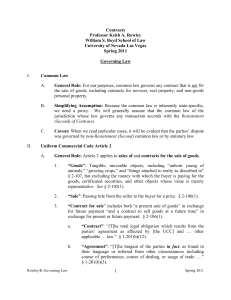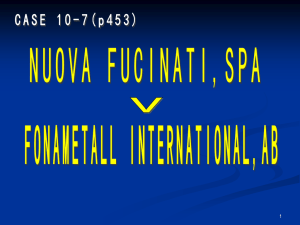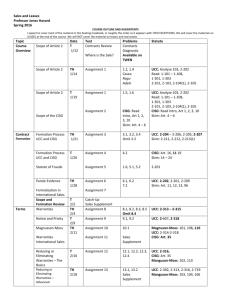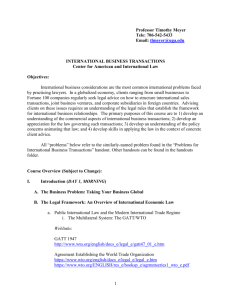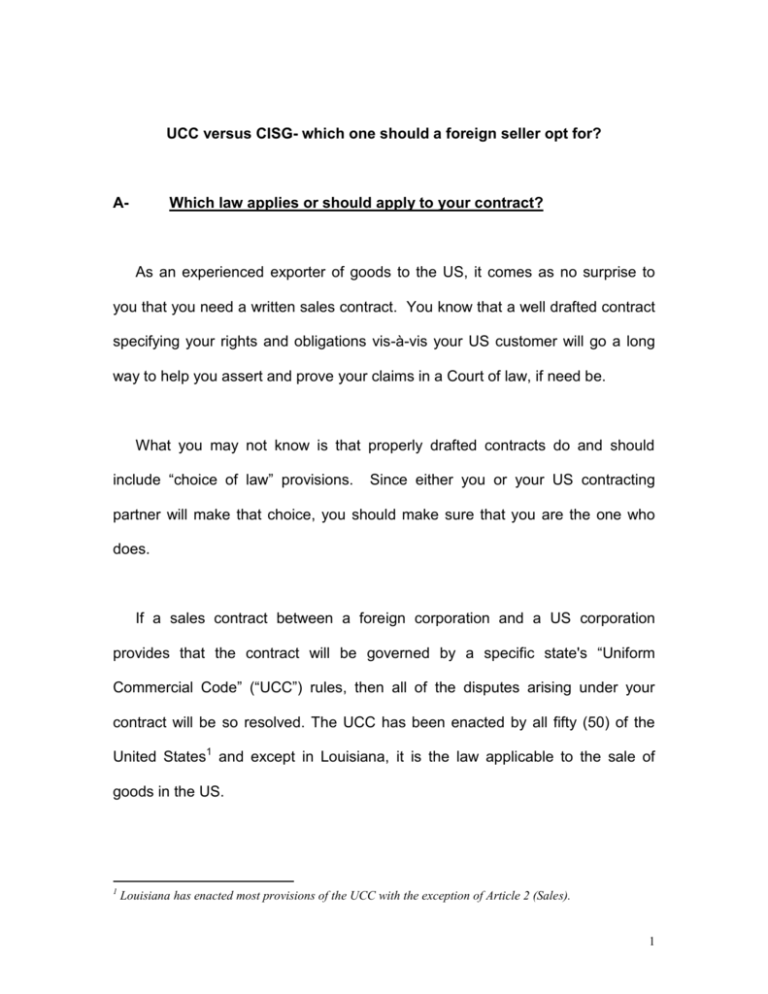
UCC versus CISG- which one should a foreign seller opt for?
A-
Which law applies or should apply to your contract?
As an experienced exporter of goods to the US, it comes as no surprise to
you that you need a written sales contract. You know that a well drafted contract
specifying your rights and obligations vis-à-vis your US customer will go a long
way to help you assert and prove your claims in a Court of law, if need be.
What you may not know is that properly drafted contracts do and should
include “choice of law” provisions.
Since either you or your US contracting
partner will make that choice, you should make sure that you are the one who
does.
If a sales contract between a foreign corporation and a US corporation
provides that the contract will be governed by a specific state's “Uniform
Commercial Code” (“UCC”) rules, then all of the disputes arising under your
contract will be so resolved. The UCC has been enacted by all fifty (50) of the
United States1 and except in Louisiana, it is the law applicable to the sale of
goods in the US.
1
Louisiana has enacted most provisions of the UCC with the exception of Article 2 (Sales).
1
But what if your country is one the seventy (70) countries that have signed
and ratified the 1980 “United Nations Convention on Contracts for the
International Sales of Goods” (“CISG”)2? Then, unless the parties have clearly
and specifically excluded its applicability, the CISG will apply to your sales
contract3, provided Buyer's and Seller's respective principal places of business
are both in CISG contracting states. In other words, if both parties' principal
places of business are in CISG countries4, the CISG is the default choice.
Even if one or more parties do not have their principal places of business in
the CISG’s contracting States, the parties can still choose to have the CISG
govern their contract.
The CISG was adopted to respond to a practical difficulty: The absence of a
unified system of legal rules for selling goods abroad.
The purpose of this article is to point out some situations in which you should
prefer the CISG (the default choice if you are from a CISG contracting state and
are doing business with a US company), and those when you will be better
served by expressly choosing the UCC.
2
The list of signatory countries is available at http://www.biu.ac.il/law/cisg/signatoriesEng.htm
3
Unlike the UCC, the CISG does not define the term "Goods." However, the CISG will not apply to
contracts predominantly for the provision of "services or labor."
4
Besides the US, the list of signatories to the CISG also includes Spain, France, Italy, Germany, Mexico,
China, Israel and Canada. Turkey as of yet is unfortunately not a CISG signatory.
2
B-
Comparing main provisions of the CISG to the UCC
I. The Statute of Frauds
The term “Statute of Frauds” stands for the common law principle
incorporated in various statutes that certain types of contracts need to be in
writing in order to be legally binding.
The UCC contains such a Statute of Frauds. Therefore under the UCC, a
contract for the sale for goods over $500 must be in writing to be enforceable in
the US courts. Basically, formality is very important when doing business in the
US market.
The CISG on the other hand was drafted to meet the needs of businessmen
who prefer to conduct business without restraints imposed by formalistic
requirements. Unlike contracts governed by the UCC, a contract of sale under
the CISG need not to be in writing, and is not subject to any form requirements.
This provision sometimes raises skepticism among US businessmen since
the writing requirement in the UCC is believed to prevent fraudulent claims.
However, one should keep in mind that although the CISG does not require a
written contract, the existence of the contract still needs to be proved by the party
3
seeking enforcement. Under the CISG a party can prove a sales contract by any
means, i.e. invoices, purchase orders, witnesses, etc.
Since whenever Buyer's and Seller's respective places of business are in
CISG Contracting States, the CISG applies by default, it follows that whenever
there is no written contract the CISG rules apply automatically. Your US
customer may be surprised to learn that a valid contract exists without a written
agreement – but you should not be.
II. The Parol Evidence Rule
US Courts applying the UCC will generally exclude trial testimony that
contradicts the specific terms of the parties' written agreement. This is known as
the Parol Evidence Rule ("PER"), and it has been a bedrock of the Common
Law. The PER presumes that a written contract encapsulates the parties'
complete agreement. Therefore, under the UCC, oral evidence cannot be used to
contradict the terms of a written contract.
The CISG however is far less strict. Here in New York, the US District Court
for the Southern District of New York -our local Federal Court- applying the CISG
held Parol Evidence regarding the parties' negotiations admissible to the extent
that they reveal the parties' subjective intent.5 Citing another Federal Case6, the
5
Teevee Toons, Inc. (D/B/A Tvt Records) & Steve Gottlieb, Inc. (D/B/A Biobox),
Plaintiffs, - against - GERHARD SCHUBERT GMBH, Defendant.
4
District Court specifically stated that "the CISG, unlike American contract law,
includes no Parol Evidence rule, and "allows all relevant information into
evidence even if it contradicts the written documentation."7
Therefore, if you find yourself in the situation of having to prove the actual terms
of an agreement which by definition would be Parol Evidence, you will only able
to do so if the contract is subject to the CISG, either by default or choice.
III. The Battle of the Forms
The term “Battle of the Forms” refers to the situation where the customer
sends you a purchase order containing certain terms of sale, and you the seller
respond with an acceptance, or an invoice, that contains different terms of sale.
The issue then becomes whether there is a valid contract and if so, on which
terms have the parties agreed.
00 Civ. 5189 (RCC)
UNITED STATES DISTRICT COURT FOR THE SOUTHERN DISTRICT OF NEW YORK
2006 U.S. Dist. LEXIS 59455
Claudia v. Olivieri Footwear Ltd., No. 96 Civ. 8052 (HB)(THK), 1998 U.S. Dist.
LEXIS 4586, 1998 WL 164824, at *4-*5 (S.D.N.Y. Apr. 7, 1998)
7
The District Court in TEEVEE TOONS, INC. noted that CISG Article 8 explained such oral
evidence of the parties' intention is to be interpreted:
6
(1) For the purposes of this Convention statements made by and other conduct of a party are to
be interpreted according to his intent where the other party knew or could not have been unaware
what that intent was.
(2) If the preceding paragraph is not applicable, statements made by and other conduct of a party
are to be interpreted according to the understanding that a reasonable person of the same kind
as the other party would have had in the same circumstances.
(3) In determining the intent of a party or the understanding a reasonable person would have had,
due consideration is to be given to all relevant circumstances of the case including the
negotiations, any practices which the parties have established between themselves, usages and
any subsequent conduct of the parties.
5
The CISG and UCC differ on these important questions: The UCC deems a
valid contract to have been formed as long as both sets of forms agree on basic
business terms, such as the description of the goods, the sales price, the
quantity, and maybe a few additional terms. The additional terms you have put in
your acceptance are disregarded, and the terms of the original purchase order
govern the contract. This is the UCC rule unless you make it clear in your
acceptance form that your additional terms are mandatory. Then, if the buyer
refuses to accept your terms, the UCC provides that there is no contract.
On the other hand, in this situation, the CISG follows the old rule and provides
that a contract is formed only when the “meeting of minds” occurs. The CISG
has express provisions to handle the problem of forms that contain additional
terms. If the additional terms do not materially alter the facts of the offer, then a
contract is formed under CISG. If they do, there is no “meeting of the minds” and
no valid contract.
What is the practical effect of all this? Let us say you get a purchase order
from a US buyer that (1) expressly provides for the law of one of the US states
(i.e., the UCC) and (2) contains certain terms that you find objectionable. To
avoid those terms, you must expressly make your acceptance conditional on the
buyer’s accepting your changes. It is not enough to send back an acceptance
containing different terms.
6
But suppose you get a purchase order that contains objectionable terms but
does not expressly provide for application of the UCC. Then the CISG applies
(provided both parties are from CISG countries), and you may send back an
acceptance that changes the terms of the original purchase order. You must be
aware, however, that you take the risk of your changes being found to be
“material alterations” which would then invalidate the entire contract.
IV. Warranties and Warranty Disclaimers
Under both the UCC and the CISG, there is an underlying obligation of any
seller to provide goods that are fit for their usual purpose. The UCC calls this
fitness “implied warranty of merchantability.” This warranty imposes on
merchants the duty to ensure that goods they commonly sell to other merchants
such as yourself are of merchantable quality. Because it is by operation of law
implied in every such contract, regardless of whether the merchant seller is
aware of such a warranty, its impact is widespread. However you should know
that the implied warranty of merchantability does not require the Seller to provide
you with "flawless, perfect goods", but merely goods that will be usable for the
ordinary purposes for which such goods are generally used8. The practical utility
of the implied warranty of merchantability is that it allows buyers to rely on an
expectation of reasonable quality in the absence of any contractual language
8
N.Y. UCC § 2-314(2)(c).
7
providing for greater or lesser warranties. Sellers may disclaim the warranty of
merchantability only if they mention that word specifically, and such disclaimer
must be both written and conspicuous.
The UCC also provides for express warranties. UCC Section 2-313 sets forth
the three (3) ways in which you as seller can create an express warranty: First,
"[a]ny affirmation of fact or promise made by the seller to [a] buyer which relates
to the goods and becomes part of the basis of the bargain creates an express
warranty that the goods shall conform to the affirmation or promise. 9" Second,
"[a]ny description of the goods which is made part of the basis of the bargain
creates an express warranty that the goods shall conform to the description. 10"
Third, "[a]ny sample or model which is made part of the basis of the bargain
creates an express warranty that the whole of the goods shall conform to the
sample or model11.
The CISG on the other hand, does not have any formalistic rules about
warranty disclaimers. CISG Article 36(2) states that "[t]he seller is also liable for
any lack of conformity . . . which is due to a breach of any of his obligations,
including a breach of any guarantee that for a period of time the goods will
remain fit for their ordinary purpose or for some particular purpose or will retain
specified qualities or characteristics." The assumption is that the goods are fit for
9
N.Y. UCC § 2-313(1)(a)
10
N.Y. UCC § 2-313(1)(b)
11
N.Y. UCC § 2-313(1)(c)
8
their ordinary use12. A valid disclaimer of warranty requires an express
agreement of both parties, but it does not have to be either written or
conspicuous. And it does not have to contain the word “merchantability.” What
does this mean in practice? You as a seller will be better served by a rule that
allows you to disclaim this warranty in the simplest way. The CISG is therefore
your choice whenever you anticipate needing to disclaim the warranty of
merchantability.
C-
Instances in which the UCC provisions are advantageous to the
foreign seller
You should not conclude that the CISG is always the better option for you as
exporter to the US. There are certain situations in which the application of the
UCC can be beneficial, and the following are examples of them.
12
CISG Article 35 provides in pertinent part, that a "seller must deliver goods which are of the
quantity, quality and description required by the contract and which are contained or packaged in
the manner required by the contract." CISG art. 35(1). Goods do not conform with the contract,
except where the parties have agreed otherwise, unless they:
(a) are fit for the purposes for which goods of the same description would ordinarily be used;
(b) are fit for any particular purpose expressly or impliedly made known to the seller at the time of
the conclusion of the contract, except where the circumstances show that the buyer did not rely,
or that it was unreasonable for him to rely, on the seller's skill and judgment; [and]
(c) possess the qualities of goods which the seller has held out to the buyer as a sample or model
....
9
I. Definiteness of Terms and Price
Where certain terms of the agreement, specifically the price, are actually not
set forth in the offer, the CISG would most likely conclude that no contract was
created. Art. 14 of the CISG has been interpreted to require that the offer either
explicitly or implicitly refer to the price, quantity etc. Under the UCC, a valid
contract can be created even if the offer fails to state certain items such as
quantity or price.13
This can be of advantage in the common situation where the contract was
essentially negotiated orally or there is only a purchase order from the buyer, but
it does not state the price, and you, as the seller, are now in the difficult situation
to prove the existence of a valid contract.
II. Revocation of Offer
Under the UCC, a party may in general revoke an offer at any time before
acceptance by the other party. However, if the offering party has promised in
writing to keep the offer open, then it is precluded from retracting the offer, either
for the period specified or, if none is specified for a reasonable time period not to
exceed three months.
13
NY UCC § 2-204(3: [:e]ven though one or more of its terms are left open, a contract for sale does not
fail for indefiniteness if the parties have intended to make a contract and there is a reasonably certain basis
for giving an appropriate remedy.
10
The CISG, however, makes an offer irrevocable if the recipient of the offer
has reasonably taken action in reliance on the offer prior to receiving notice that
the offer is revoked. It does not set an express time limit for the offer to remain
open (however, Art. 18 (2) states that when there is no set time for the
acceptance, it must occur within a “reasonable” time).
If, for example, an overseas supplier makes an offer to a US buyer, under the
CISG it may be obligated to perform on this offer if the buyer can show that it
acted in reasonable reliance on the offer. The UCC however, would allow the
supplier to retract the offer as long as the offeror did not promise the contrary,
and provided the offer is revoked before the offeree has accepted the offer.
Under these circumstances, the UCC provides an easier way out if you made an
offer on which you do not want to follow through afterwards.
D-
Parties can opt out of the CISG in a sales contract
The CISG allows contracting parties to opt out of its provisions and choose
the application of a different body of law. Generally, any party would prefer to
choose its own country’s laws. The incentives for this choice are many: possibly
better protection under the laws, familiarity with the local laws and procedure,
getting a contract satisfactory to local lenders, etc.
11
On the same token, your US customer will naturally prefer the UCC. You
should anticipate this and read the standard contract terms in a sales contract or
a purchase form with a careful eye.
Since it is highly unlikely you will convince your US customer to accept your
national law (CISG excepted)14, how can you prevail upon him to at least agree
to choose the CISG? By explaining to him/her that here in the United States and
anywhere it has been adopted, the CISG is widely viewed as providing evenhanded rules for contracting parties to fashion their own contract, by allowing
them to derogate from or vary the effect of any of the CISG's provisions.
Supremely flexible, the CISG clearly responds to the needs of the international
business community. In other words, not opting out of the CISG provides parties
with the ability to fashion exactly the contract they desire, and enables them to do
so on equal terms. Further remind your customer that choosing the CISG will
provide a single set of rules for all their foreign purchases.
You should be aware that there are some disadvantages of not opting out of
the CISG: First and foremost is the unpredictability in interpretation of the CISG
by different countries’ courts. Indeed, there is no mechanism to ensure that the
CISG will be interpreted in the same manner in identical cases before two (2)
different countries’ courts.
14
Since the proof of your own country's national law (CISG excepted) in US Courts is very likely to require
you to -at your own expense- provide a foreign lawyer that the Court will qualify as an expert witness on
foreign law, it is not clear it is even in your best interest to attempt to convince your client that your own
country's national law (CISG excepted) should apply in the event of a dispute.
12
However, in the three (3) decades that followed US adoption of the CISG, a
substantial body of interpretive decisions has accumulated here in the United
States. Your choice of law is therefore now clearer than ever, and your
opportunities for making a wise choice of law have substantially increased.
This guide was prepared by Zara Law Offices, 111 John Street, Suite 510, New York,
NY 10038, www.zaralawny.com; all proprietary or other rights in this Chart belong
exclusively to Zara Law Offices. The unauthorized reproduction or dissemination of any
part thereof without specific prior written consent is prohibited. © Zara Law Offices
2010. All rights reserved.
13




